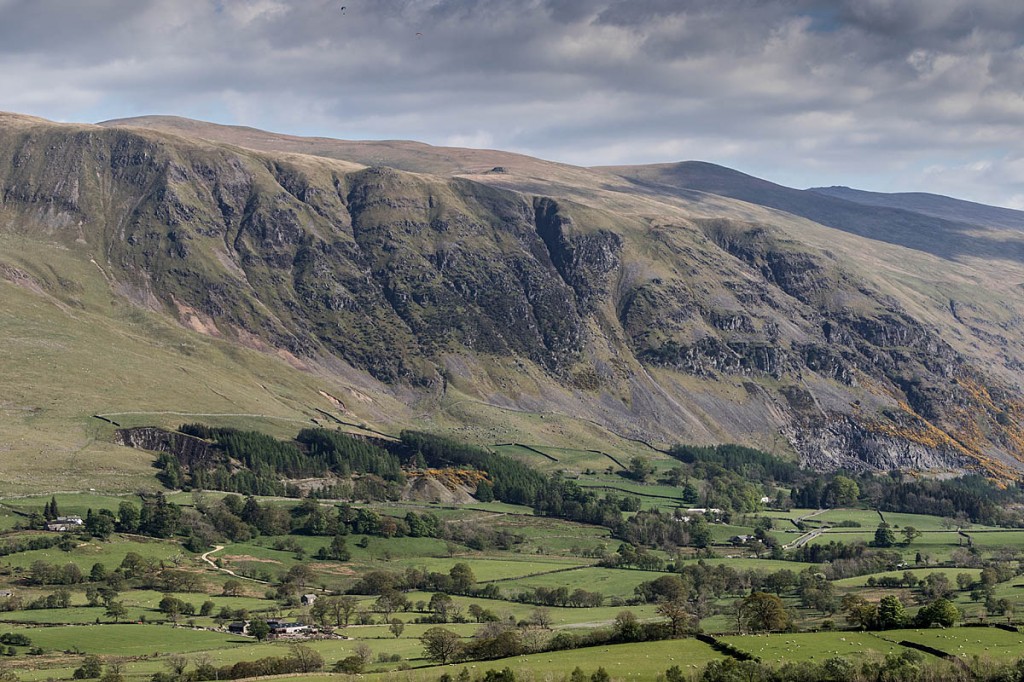Detective work by a member of Cumbria police’s staff has uncovered the story behind a Lakeland landmark’s name.
Keen local historian Raymond Greenhow, who works for Cumbria Constabulary, was determined to get to the bottom of how Policeman Crag came by its name.
The cliff, whose name is not marked on Ordnance Survey walkers’ maps, lies near the top of Fisher’s Wife’s Rake on Wanthwaite Crags, overlooking St John’s in the Vale on Clough Head’s western flanks.
Mr Greenhow, an alarms manager with the force, began researching the tale of Policeman Crag after seeing a reference to the death of a policeman on Clough Head. Local people knew of the crag name reference but no-one seemed to know to whom, when and how this referred.
He identified the crag’s name to be a reference to PC James Armstrong who died on 30 September 1847.
Mr Greenhow’s research of public records and papers led him to the report of an inquest held at the Royal Hotel in Keswick on Monday 4 October 1847.
Constable James Armstrong’s body was laid out before the coroner’s court following its discovery at the foot of Wanthwaite Crags, near Threlkeld. The court heard that on Wednesday 29 September, PC Armstrong set out to travel from Keswick to Pooley Bridge on foot to execute a warrant of a non-payment of a fine.
Following the payment PC Armstrong made his way back to Keswick. On his travel back he became lost and, instead of keeping to the road, his disorientated route took him high up Wanthwaite Crags. On trying to get lower he fell more than 300ft, leaving a trail of blood which resulted in his eye being knocked completely out, his right leg and arm being broken, nearly all his ribs fractured and his neck broken.
PC Armstrong, 40, of the Derwent Division, left behind a widow and three children. The inquest’s verdict was one of accidental death and the evidence suggested the officer in darkness had lost his way, venturing high on the fell before trying to retrace his steps, resulting in the fatal fall.
Raymond Greenhow said: “This is an interesting but sad tale of an officer who died in the execution of his duty which was a non-payment of a fine warrant.
“The incident has lived on in the memory of the local people of Wanthwaite and Threlkeld. With the specific crag now referred to as Policeman Crag in memory of a pillar and protector of the community.
“His death shows the demands on a police officer back then, with the execution of a warrant taking days to complete in what would have been difficult weather conditions.”
James Armstrong has now been included on a roll of honour of police officers who have died in the line of duty.

Roy Haythornthwaite
21 December 2016An excellent article and well researched, I traced the route he must have walked and it was between 40 and 50 miles there and back so presumably he took two days, if not the no wonder he was tired and if it was poor weather then even worse.
I do hope his wife and children were well taken care of.
Raymond Greenhow
22 December 2016Thanks for the comment Roy. I have more on the incident and you are right, it was a two day event. His wife remained in Keswick but never remarried and baked bread. She was about 75 when she died in 1879; both James & Catherine lie in unmarked graves, hence they were a forgotten piece of Keswick history.
Sidney MacKay, Chairman, Police Roll of Honour Trust
22 December 2016A fascinating piece of local history fleshing out the reason for the crag being named and the story behind it. At that time most journeys were made on foot and after an undaunted effort to do his duty the constable died in such a tragic way.
Ray is to be commended for this detailed and previously unrecorded account of police history. In bringing this tragedy to notice the record of the death is now recorded in the Police Roll of Honour Trust so that PC Armstrong will be remembered in the future and not forgotten as he has been in the last 150 years.
Simon Smith
09 August 2018Ray
Many thanks for telling me about this when we met on Hindscarth this morning. Fascinating to read your research and I'll have a good look next time I'm on Fisher's Wife's Rake. Many thanks also for the information about the north cairn on Hindscarth and the Langstrath bridges.